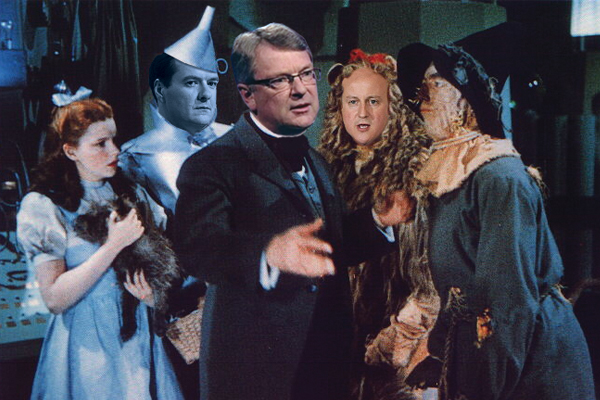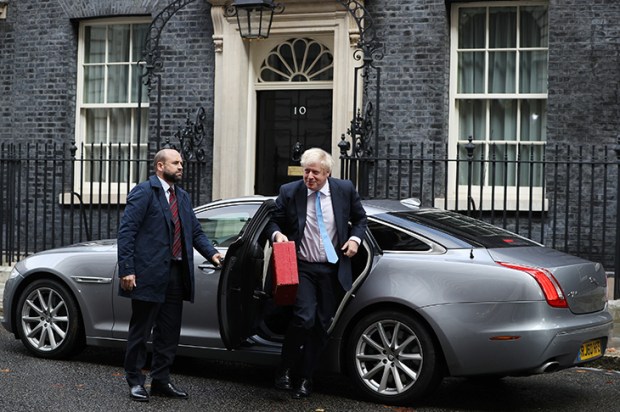The mood was grim when David Cameron, George Osborne and their advisers convened for a crunch meeting on 4 February this year. The economy had shrunk in the final three months of last year; the country was on the verge of a triple-dip recession, unprecedented in modern times. The government was in dire political straits.
Those present discussed the situation with appropriate solemnity. But the tension was broken when Rupert Harrison, the Chancellor’s chief economic adviser, passionately declared that the economy would be going ‘gangbusters’ by late summer, early autumn. Ed Llewellyn, the Prime Minister’s chief of staff, chuckled and joked that he would take a note of that confident prediction.
Eight months on, and as Downing Street aides like to point out, the ‘gangbusters’ note hangs proudly on Harrison’s office wall. Consistent growth has, at long last, returned and the government is waiting for official confirmation that the economy has grown at a robust rate for a second successive quarter.
On current trends, Britain could be looking at the economy expanding by around 3 per cent next year. Not quite ‘gangbusters’, but a dramatic improvement from bumping along the bottom. To improve the mood further in Downing Street, it turns out that the country never went into a double dip. The Office for National Statistics’ initial figures were — as so often — just wrong.
The turnaround is a reminder that it is often darkest before the dawn in politics. It also shows just how quickly economic conditions can change, for better or worse. So we should treat the Westminster assumption that things are going to get better between now and the next election with appropriate caution. But the political conversation is moving rapidly away from the confines of austerity. The party conferences were, this year, once again dominated by talk of new government programmes and extra spending. For their part, Tory MPs are increasingly hopeful of a pre-election tax cut.
The Treasury is trying to stop this shift. It is quick to point out that, even with the return to growth, the deficit will still be more than a £100 billion this year. This gap between what the government brings in and what it spends won’t be wiped out just by the economy returning to health. Instead, it will require continuing, deliberate cuts to the budgets of government departments. Osborne himself tried to concentrate minds on that point by using his conference speech to announce that he wanted the government to be running a surplus by the end of the decade. There was an economic and a political reason for this declaration. The economic one was that government debt is alarmingly high, both in absolute terms and in relation to GDP. If it is not reduced, the country would struggle to cope with another global recession.
The political rationale was that the Tories’ greatest advantage over Labour is on dealing with the deficit. The more the Tories can make the next election about who you trust to get the deficit down, the better it’ll be for them. Also this fiscal plan means that the Tories can claim that if Labour breaks from it, interest rates and mortgage rates will go up. But the Tories know that deficit reduction alone will not be enough. After Ed Miliband’s promise to freeze energy bills for 20 months if elected, the Tories are all too aware that Labour intends to campaign on the ‘cost of living crisis’.
The Tories have no desire to play on Miliband’s turf. But must try to neutralise this issue; hence Cameron’s intervention on energy prices and green taxes at PMQs this week. They know they have to make sure ‘we’re all in this together’ applies to the joys of recovery as much as it did to the pain of recession.
Osborne’s ministerial allies are much struck by numbers showing that because of tax cuts, disposable incomes are going up despite prices rising faster than wages. They believe that this shows that letting people keep more of their own money should be the Tory response to the cost of living squeeze. This view chimes with the party’s natural instincts. Tory MPs are rarely happier than when Cameron is declaring at Prime Minister’s Questions that ‘if we want to help with living standards, the best way to do that is to cut people’s taxes’. It reassures them that the next election, unlike the last, with the Tories’ muddled message about ‘joining the government of Britain’, will be fought on ground they are comfortable with.
Number 10 staff are quick to add that Cameron’s increasingly regular invocations of tax cuts at PMQs are ‘manifesto thoughts’. I understand that this year’s autumn statement will contain no ‘giveaways’ beyond the commitment to keep fuel duty frozen.
For the Tories, there are two particular challenges beyond maintaining their poll lead on economic competence. First, they need to come up with their own ‘retail offer’ to voters. When it comes to the campaign, they have to be able to tell voters how they would be better off under the Conservatives. To be credible, these policies have to be in place long before the election is called. As Lynton Crosby, the Tories’ campaign chief, complained after the 2005 election, ‘You can’t fatten a pig on market day.’
The second is to show that the proceeds of growth are being shared. Too many voters see the Tories as an essentially southern party, something Downing Street is trying to counter via infrastructure and the promotion of northern Tory voices. If the recovery boosts the south more than anywhere else, this stereotype will be strengthened. It is worth noting that outside London and the south and east, employment is still below pre-crisis levels.
But perhaps the most damaging charge against the Tories is that they are the party of the rich. In a recent YouGov poll, 84 per cent of voters said the Tories represent the rich. Another poll showed that people thought the Tories were twice as likely to cut taxes for the better off than the poor. If the Tories are going to counter this perception, they are going to need a set of policies aimed at helping low-earners specifically.
A triple-dip recession would almost certainly have doomed the Tories. Growth alone, though, won’t keep them in Downing Street. To stay in office in 2015, Cameron and Osborne will have to show that the proceeds of growth are being shared.
Got something to add? Join the discussion and comment below.
Get 10 issues for just $10
Subscribe to The Spectator Australia today for the next 10 magazine issues, plus full online access, for just $10.
You might disagree with half of it, but you’ll enjoy reading all of it. Try your first month for free, then just $2 a week for the remainder of your first year.















Comments
Don't miss out
Join the conversation with other Spectator Australia readers. Subscribe to leave a comment.
SUBSCRIBEAlready a subscriber? Log in